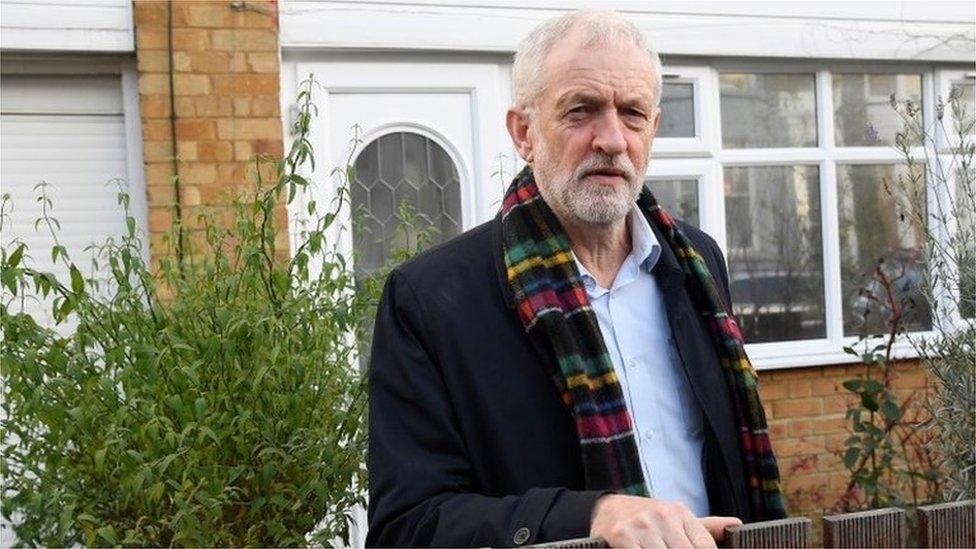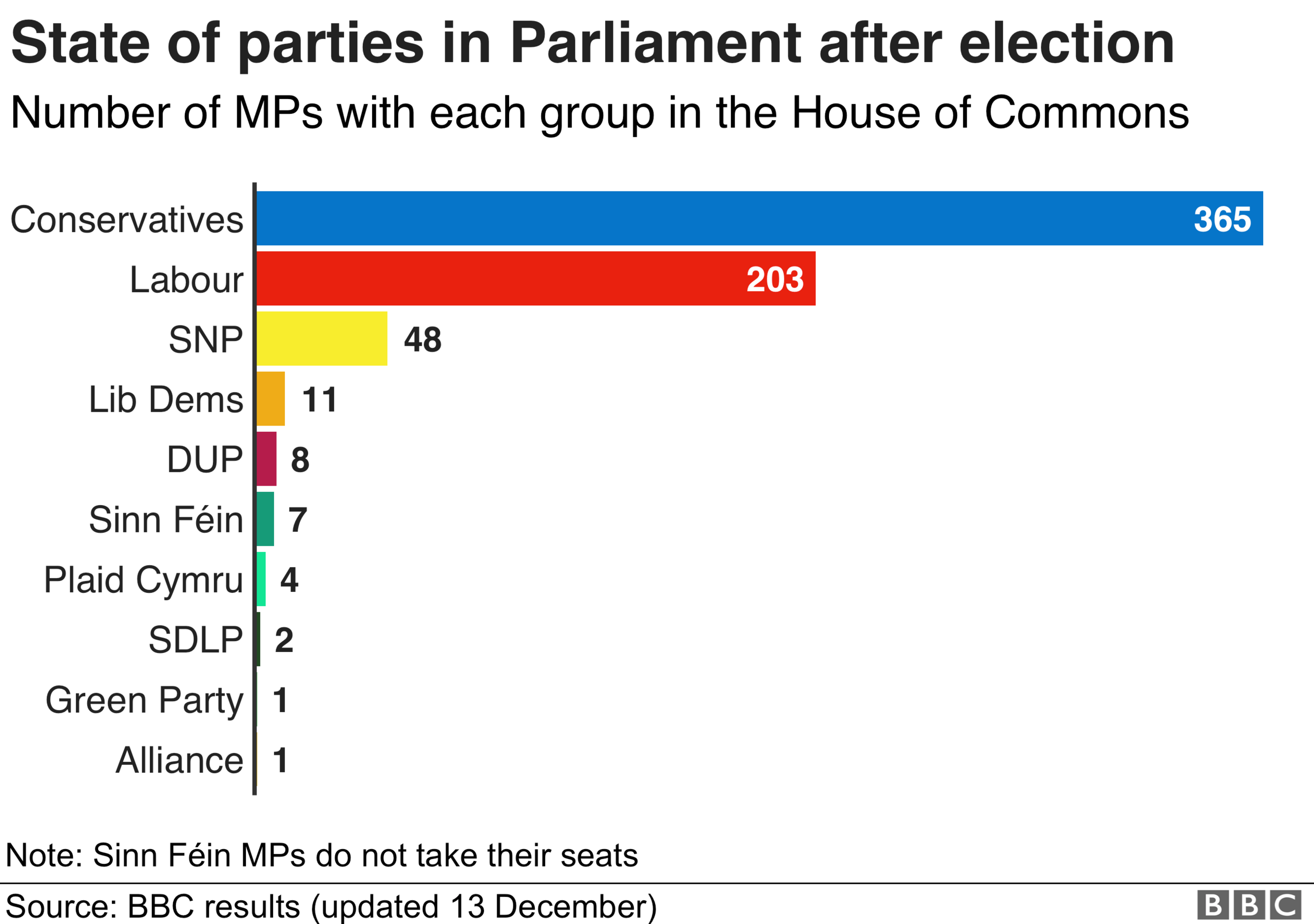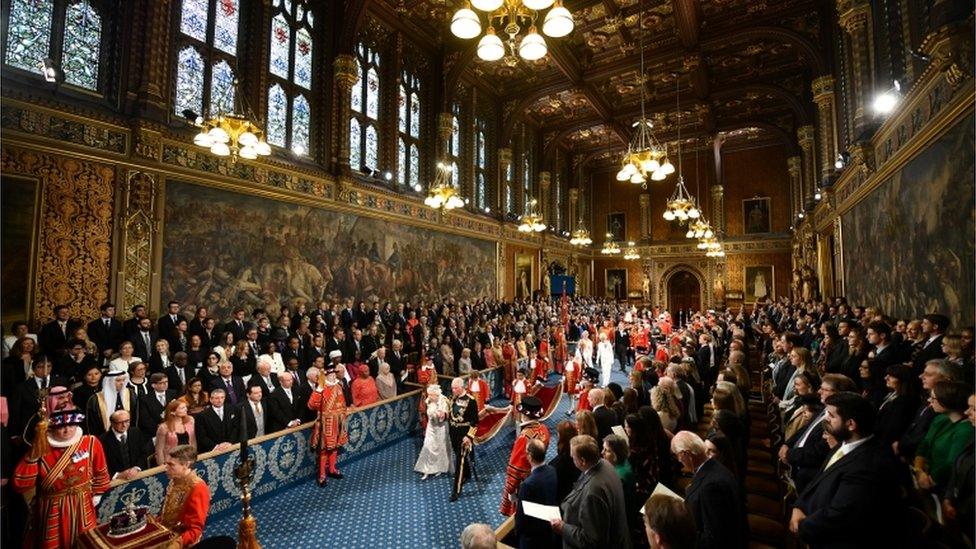General election 2019: Jeremy Corbyn apologises over heavy Labour defeat
- Published

Jeremy Corbyn has apologised to Labour supporters over his party's heavy defeat in the general election.
Writing in the Sunday Mirror and the Observer, he acknowledged the party's failings in the poll and said he accepted his responsibility for it.
It comes as two likely leadership candidates - Lisa Nandy and Jess Phillips - have set out their stalls ahead of the race to succeed Mr Corbyn.
Boris Johnson will unveil his Queen's Speech on Thursday.
It will include a commitment to enshrine increases in spending on the NHS in England in legislation.
But cabinet minister Michael Gove would not say when the government's Withdrawal Agreement Bill would return to Parliament, telling Sky's Sophie Ridge it would be a "top priority".
Mr Johnson won a Commons majority of 80 in Thursday's general election, his party's biggest election win for 30 years, sweeping aside Labour in its traditional heartlands.
In contrast, Labour suffered its worst election result since 1935 and saw its vote share fall by 8 points.
In his open letter to the Mirror on Sunday, external, Mr Corbyn said: "I will make no bones about it. The result was a body blow for everyone who so desperately needs real change in our country.
"I'm sorry that we came up short and I take my responsibility for it."
But Mr Corbyn insisted he remained "proud" of the party's campaign, and that it had offered a message of "hope" in the election.
The Labour leader - who is expected to stand down early next year - added that the party is determined to regain the trust of lifelong Labour voters who had abandoned it.
Labour's "red wall" across the Midlands and the north of England - the bedrock of the party's support for generations - crumbled as the Conservatives claimed key marginal seats on Thursday night and into Friday.
Boris Johnson: "We are not the masters, we are the servants now"
Mr Johnson went to former prime minister Tony Blair's old seat of Sedgefield on Saturday to thank voters in the north of England for "breaking the voting habits of generations" to back the Conservatives.
In a speech, he acknowledged "how difficult" that decision could be and said the Conservatives would repay people's trust.
Writing in the Observer, Mr Corbyn said his own election campaign had successfully re-set the terms of debate and his manifesto would be seen as "historically important", external.
"I am proud that on austerity, on corporate power, on inequality and on the climate emergency we have won the arguments and rewritten the terms of political debate," he said.
However, he said there was "no quick fix to overcome the distrust of many voters".
Labour MP Margaret Hodge - a longstanding critic of Mr Corbyn's - tweeted, external the word "denial" in response to the article.
Jeremy Corbyn: "There is no such thing as Corbynism"
Among the potential candidates to take over the Labour Party leadership are Birmingham Yardley MP Ms Phillips and Wigan MP Ms Nandy.
In the Observer, Ms Phillips appeals to people to join Labour to change it, external, and argues that too many working-class people do not believe Labour is better than the Tories.
While Ms Nandy has said the party has lost touch with the day-to-day lives, external of the people it wishes to represent.
There will be initial discussions next week on drawing up a timetable for electing a new Labour leader.
The party's ruling national executive is likely to take the final decision at a special meeting in early January.

WHO WON IN MY CONSTITUENCY? Check your result, external
NATIONAL PICTURE: The result in full, external
ALL YOU NEED TO KNOW: The night's key points
MAPS AND CHARTS: The election in graphics, external
BREXIT: What happens now?
IN PICTURES: Binface, a baby and Boris Johnson

Following the Conservatives' election win, MPs will return to Westminster on Tuesday and begin the process of swearing in, before the Queen formally opens Parliament on Thursday.
Mr Johnson's Queen's Speech will include a commitment by the party to put its NHS spending plan into law as a symbol of commitment to the health service.
The Tories have said that NHS spending will reach £33.9bn each year by 2023-4.

Downing Street has confirmed there will be a review of Whitehall departments - and the Sunday papers report that the prime minister will work over Christmas on plans to merge and split different government offices.
The Sunday Telegraph says the PM's chief adviser Dominic Cummings is preparing an overhaul of the civil service, external to ensure it delivers on Mr Johnson's agenda.
But Mr Gove said the government would not grant Scotland another referendum on independence, despite the success of the SNP in Thursday's election.
The party, which campaigns for an independent Scotland, won 48 seats - up from 35 - and its leader, Nicola Sturgeon, said she had "earned the right to pursue the plan" for another vote.
Ms Sturgeon, who is also First Minister of Scotland, said: "They will rage against reality for as long as they can but Scotland has chosen a very different kind of future than most of the rest of the UK, and they cant stand in the way of the will of the Scottish people.
"Fundamentally democracy has to be offered and respected."
Meanwhile, the Sunday Times claims up to a third of cabinet ministers face the sack in February, external, Whitehall departments could be abolished and civil servants replaced by external experts.
It's also been confirmed that the government has ordered a review to consider decriminalising non-payment of the BBC licence fee - which costs £154.50 annually.

What will happen this week?

The earliest the State Opening of Parliament could be is Monday
Tuesday
Proceedings begin when MPs gather for their first duty: to elect the Speaker, Sir Lindsay Hoyle, who replaced John Bercow in November. Technically, MPs can hold a vote on this motion but this has never happened in practice.
Later in the day, the Speaker will begin the process of swearing in MPs, who are required to take an oath of allegiance to the Crown, or, if they object to this, a solemn affirmation. Those who speak or vote without having done so are deprived of their seat "as if they were dead" under the Parliamentary Oaths Act of 1866.
Two to three days are usually set aside for this process.
Thursday
This is the earliest possible day for Parliament's State Opening. The Queen's Speech is the centrepiece of this, when she will read a speech written by ministers setting out the government's programme of legislation for the parliamentary session. A couple of hours after the speech is delivered, MPs will begin debating its contents - a process which takes days.
Friday
Depending on how rapidly Boris Johnson wants to move, the debate on the Queen's Speech could continue into Friday.
This may be interrupted for a second reading debate on the Withdrawal Agreement Bill. MPs previously backed Boris Johnson's bill at its first stage but rejected his plan to fast-track the legislation through Parliament in three days in order to leave the EU by the previous 31 October Brexit deadline.
After the debate on the Queen's Speech is concluded, MPs will vote on whether to approve it. Not since 1924 has a government's Queen Speech been defeated.
Read more from the BBC's parliamentary correspondent, Mark D'Arcy.



What is your question about the election results?
In some cases your question will be published, displaying your name and location as you provide it, unless you state otherwise. Your contact details will never be published. Please ensure you have read the terms and conditions.
Use this form to ask your question:
If you are reading this page and can't see the form you will need to visit the mobile version of the BBC website to submit your question or send them via email to YourQuestions@bbc.co.uk, external. Please include your name, age and location with any question you send in.